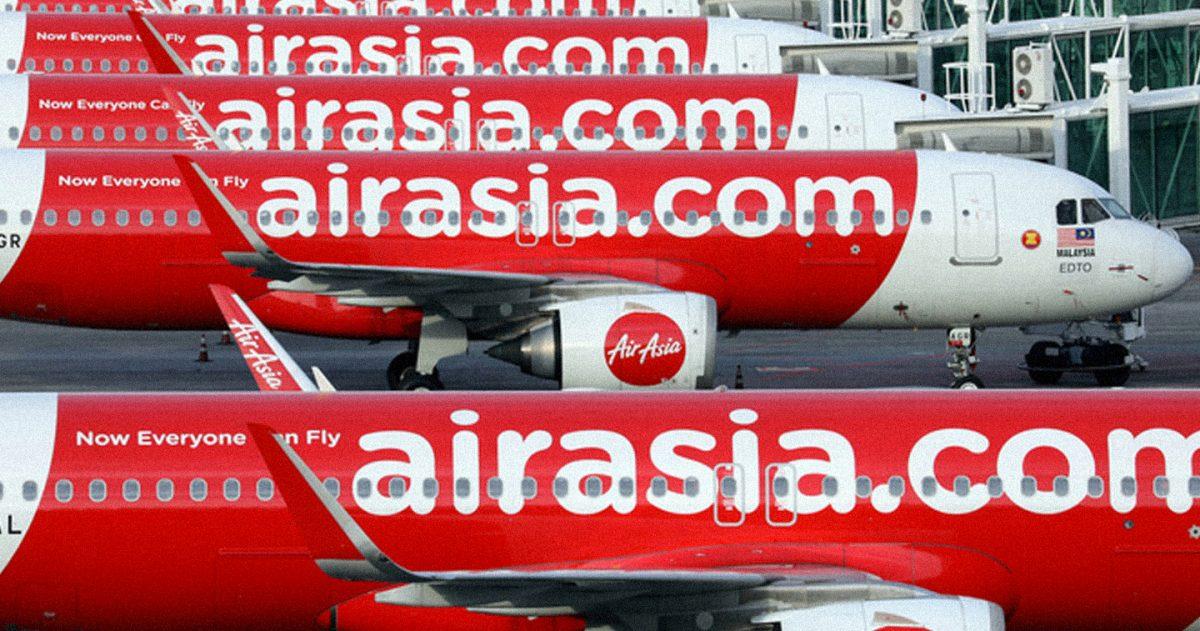SEPANG, MALAYSIA — AirAsia Group Berhad (“AirAsia” or the “Group”) has reported its financial results for the quarter ended 30 June 2021 (“2Q2021”).
Unaudited Consolidated Second Quarter 2021 Results of AirAsia Group Berhad
The Consolidated Group posted 2Q2021 revenue of RM371 million, higher by 161% year-on-year (“YoY”) and 24% quarter-on-quarter (“QoQ”). Aviation revenue declined 8% QoQ but increased 176% YoY off a low base due to the fleet hibernation for the most part of 2Q2020 caused by the onset of the pandemic. Digital businesses reported stronger revenue, up 147% YoY led by contributions from Teleport, which tripled its revenue YoY driven by a higher number of cargo-only flights and deliveries.
EBITDA loss was RM207 million for the quarter, which narrowed by 70% YoY and 5% QoQ. Fixed costs were successfully reduced by 15% YoY despite a low base in 2Q2020, primarily attributed to lower staff costs. Net operating cash flow burn was lower QoQ, averaging RM62 million per month in 2Q2021.
The airasia Super App reported strong revenue growth of 39% YoY, attributed to new product offerings and commissions. BigPay posted significant growth in revenue, up 56% YoY driven by payments and remittances. Teleport’s revenue tripled YoY due to a higher number of cargo-only flights and significant delivery demand volume through scheduled cargo networks connecting India, China, Korea, and Japan through ASEAN.
The Consolidated Group posted a 2Q2021 Net Loss After Tax of RM720 million, which narrowed by 38% compared to the Net Loss After Tax of RM1.2 billion in 2Q2020. Although aviation revenue was much higher by 176% YoY, active capacity management and concentration on flying the most profitable routes as well as lease restructuring, asset optimization, and targeted cost control resulted in a 54% reduction in aviation operating expenses YoY. The absence of fuel swap loss for the quarter also contributed to better performance.
Operating & Market Share Performance
Key operational metrics improved significantly YoY for all four entities, on the back of a low base in 2Q2020. As for QoQ performance, AirAsia Philippines progressed steadily with a 2% increase in the number of passengers carried and an improvement of 4 percentage points (“ppts”) in load factor, to reach a commendable 78%, while AirAsia Indonesia’s load factor increased by 11 ppts. Revenue per ASK (“RASK”) for the Consolidated Group was flat at 15.93 sen during the quarter, while load factor was firm at 68%, 9 ppts higher YoY, supported by active capacity management.
Cost Performance
Airline operating expenses for 2Q2021 were reduced by 54% YoY while fixed costs were efficiently reduced by 15% YoY despite a low base in 2Q2020. The reduction was flat on a QoQ basis. Airline staff costs declined the most by 48% YoY and 19% QoQ, contributed by headcount rationalization, salary cuts, and natural attrition. User charges and other related expenses were reduced by 53% in line with lower traffic. The adoption of contactless procedures and digital check-in processes also aided to result in lower ground-handling costs.
On the airline performance results and outlook, President (Airlines) of AirAsia Group Berhad Bo Lingam said: “The Group posted a healthy load factor of 68% during the quarter, up 9 ppts attributed to active capacity management to match demand. This is led by AirAsia Philippines with a 78% load factor during the quarter. AirAsia Malaysia, AirAsia Indonesia, and AirAsia Thailand experienced subdued momentum QoQ due to rising Covid-19 cases in their respective domestic markets. Nonetheless, passenger numbers improved YoY with AirAsia Malaysia reporting a 64% increase YoY while AirAsia Indonesia, AirAsia Philippines, and AirAsia Thailand each increased by more than 100% YoY.
“We continued to see positive outcomes from our stringent cost-containment measures. Our 2Q2021 fixed costs were reduced by 15% despite coming off a low base. On a QoQ basis, fixed costs were flat after a consistent QoQ downtrend since the first Covid wave in late 1Q2020. Airline staff costs were down 48% YoY and another 19% QoQ due to headcount rationalization & attrition. We reported zero fuel hedging losses, which will remain nil in the upcoming quarters as it has been fully restructured.
“AirAsia Thailand resumed 11 domestic routes in early September following the relaxation of travel restrictions by the authorities, operating under strict SOPs and with enhanced hygiene measures in place. Meanwhile, AirAsia Indonesia has remained in hibernation mode since July 2021, adhering to strict containment efforts enforced by the government due to the rising number of infection cases as well as significantly subdued demand for travel. AirAsia Indonesia was recovering well prior to the hibernation, achieving as high as 70% of pre-Covid domestic capacity levels in May 2021.
“On a positive note, AirAsia Malaysia welcomes the government’s announcement of the Langkawi travel bubble opening mid-September. We expect all our airline entities to see a gradual pick-up in domestic operations in the fourth quarter, following the easing of travel restrictions in line with the increase in vaccination rates in all of our key markets.
“Quick and efficient vaccination rollouts in our key operating markets will ensure a strong recovery as soon as travel restrictions allow. Malaysia is on track to have vaccinated 80% of its population by the end of this year. Singapore has fully vaccinated 80% of its population while other ASEAN countries are progressing favorably. Across the world, many countries are already allowing vaccinated travelers in. With the accelerated vaccine rollouts across Asean, we expect to see more vaccinated travel lanes and vaccine bubbles forming which will boost a V-shaped resumption of air travel in the near future.
“Importantly, the health and wellbeing of our staff and guests remain our top priority. Our operating crew and frontline staff are 100% fully vaccinated and ready to serve our guests with stringent safety and hygiene standard operating procedures in place. We have also adopted numerous contactless procedures through technological innovations to ensure a seamless travel experience.
“We have unwavering confidence that our robust short-haul business model, lean operations, contactless procedures, combined with pent-up demand, vaccines, and travel bubble formations, will ensure a quick recovery upon the relaxation of travel restrictions in the near future. People are craving to travel again and we expect to see a strong resurgence in the visiting friends and relatives (VFR) as well as the leisure and spontaneous travel markets first.”
On Asia Digital Engineering (ADE)’s performance and outlook, CEO of ADE, Mahesh Kumar said: “Asia Digital Engineering (ADE), AirAsia’s aircraft maintenance, repair and overhaul (MRO) arm, is well on the way to revolutionize and dominate the aircraft MRO market in Asia, driven by our experienced workforce of more than 15 years managing AirAsia’s fleet, lower-cost base combined with our commitment to delivering the highest quality outcomes, diverse capabilities, state-of-the-art facilities and strong relationship with suppliers. This year, ADE has successfully obtained base and line maintenance approvals in Malaysia, received foreign approvals from Indonesian and Indian authorities for works to be carried out at ADE’s facilities, secured three external clients, and converted passenger planes to freighter planes. 2022 will be about expanding our business to attract more third-party airlines. We are focused to continue expanding our capabilities by adding at least 14 more workshops, broadening the approvals for line & base maintenance, and ramp up the activities on the digital front by developing the best-in-class applications for both airlines & MRO operations. Competitive pricing, faster turnaround, and end-to-end support coverage will shape ADE to be the preferred service provider in the region.”
On Santan’s performance and outlook, General Manager of Santan, Catherine Goh said: “Santan, our in-flight catering turned Asean restaurant brand, operates 12 restaurants across Klang Valley. Two outlets, Midvalley and Sunway Pyramid are owned while the remaining 10 are franchised. Plans to take the Santan brand to the international stage, starting with Cambodia, Thailand, Singapore, and China, have been pushed to 2022 as we await the reopening of borders and lifting of travel restrictions. In the meantime, we remain committed to expanding our restaurant network across Malaysia, with upcoming stores to be located in Penang, Ipoh, Melaka, Seremban, Sabah, and Sarawak by the end of the first quarter next year.”
On airasia Super App’s performance and outlook, CEO of airasia Super App, Amanda Woo said: “Delivering the best value and choice for consumers underpins our brand and our continuous ramp-up of the airasia Super App as an all in one travel and lifestyle platform is showing strong results. Driven by new products and commissions, revenue for the quarter was up 39% YoY. In 2Q2021, we have successfully launched airasia beauty in Malaysia and Indonesia, recognizing the high demand for e-commerce beauty and skincare products. We have also recently expanded airasia food to Penang in May, Kota Kinabalu and Johor Bahru in July, Melaka, and Bangkok in August.
“We reached a significant milestone in July this year when we acquired the Gojek businesses in Thailand for a share swap consideration, which valued airasia superapp at US$1 billion. We are thrilled with this partnership which provides a strong jump-start into the Thailand delivery market and we remain committed to leveraging the existing ecosystem while adding on new offerings. On that note, last month we launched our first ever e-hailing services as our latest product offering called airasia ride, which is now available for bookings in Klang Valley, with plans for further expansion in Malaysia and across ASEAN.”
On Teleport’s performance and outlook, CEO of Teleport, Pete Chareonwongsak said:
“Teleport’s revenue increased 67% QoQ and tripled YoY, boosted by a higher number of cargo-only flights and significant delivery demand volume through scheduled cargo networks connecting India, China, Korea, and Japan through ASEAN. During the quarter, Teleport obtained the Postal and Courier License from the Malaysian Communications and Multimedia Commission (MCMC) which authorized Teleport to operate domestic and international courier services in Malaysia. In order to meet the higher demand, Teleport has since modified two cargo-only A320 passenger planes and will soon induct our first dedicated freighter into our growing fleet. In August, Teleport successfully acquired delivery platform DeliverEat for US$9.8 million and welcomed prominent investors, including venture capital firm Gobi Partners onboard, valuing Teleport at US$300 million. In order to reach our goal to move anything across Asean better than anyone else within 24 hours, Teleport is actively establishing partnerships with other airlines to grow its cargo network, while strengthening its delivery network with end-to-end infrastructure which includes our pool of delivery drivers and riders currently numbered at 15,000 and growing.”
On BigPay’s performance and outlook, CEO of BigPay, Salim Dhanani said: “BigPay’s revenue was 56% higher YoY, driven by higher payments and remittances. During the quarter, BigPay introduced an all-in-one lifestyle insurance service, providing coverage with premiums from as low as RM30 annually, and officially applied for a digital bank license in Malaysia with a consortium of strategic partners. As for funding, BigPay secured financing of up to US$100 million from SK Group, which is a strong testament to BigPay’s credibility and commitment to becoming a leading challenger bank across ASEAN. BigPay is focused on developing microlending, transactional lending, saving and investment products as well as rolling out its existing payments and remittance products to other ASEAN countries.”
On the group’s outlook, CEO of AirAsia Group Berhad, Tan Sri Tony Fernandes said:
“Our transformation is over and AirAsia Group Berhad is now an investment holding company with a portfolio of synergistic travel and lifestyle businesses that leverage data and technology to deliver the best value at the lowest cost, supported by strong data and one of Asia’s leading brands that remains committed to serving the underserved. Innovation has always been in our DNA and we will continue to develop and expand our products and services to meet consumer demand in all of our key markets.”
“We continue to evaluate funding, potential monetization, and other corporate exercises to ensure sufficient liquidity for the Group. By the end of the third quarter of 2021, we will have completed two batches of lease restructuring and expect to complete the full exercise by the end of 2021. In August, BigPay secured up to US$100 million in financing led by SK Group. We have also proposed a renounceable rights issue of up to RM1.0 billion, which we expect to be finalized by the end of this year, subject to SC and Bursa’s approval, as well as shareholders’ approval at an Extraordinary General Meeting to be convened. Positive discussions for raising additional new capital for airlines, Asia Digital Engineering, and our digital businesses are ongoing. Through all of our strategic fundraising exercises, we expect to have sufficient liquidity for 2H2021 and throughout 2022.”










